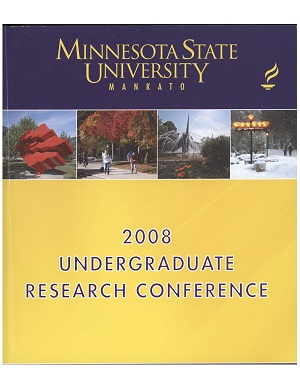Camper Council: A Meaningful Involvement Initiative
Location
CSU 255
Start Date
22-4-2008 10:30 AM
End Date
22-4-2008 12:00 PM
Student's Major
Social Work
Student's College
Social and Behavioral Sciences
Mentor's Name
Annelies Hagemeister
Mentor's Department
Social Work
Mentor's College
Social and Behavioral Sciences
Description
An increase in interest from youth and family practitioners, policy makers and researchers has given positive youth development the spotlight in this past decade. The focus for many of these individuals has been to develop a wide range of approaches to prevent youth problems and promote healthy youth development. Studies have shown success in prevention programs for youth that are focused on increasing community involvement and include four major components; safety, skill building, supportive relationships and meaningful involvement. Meaningful involvement has been identified as the most difficult component to achieve in programs for youth, specifically in resident and day camps. My paper addresses a program developed to increase meaningful involvement of campers in the camp programming at a resident all-girls camp in northern Wisconsin. The program also sought to observe leadership qualities, decision-making and feelings of belonging in the youth involved with the program. Camper and staff surveys were collected at the end of the camp sessions to provide feedback and explore how the camper council worked as a tool to empower youth through meaningful involvement. The anonymous surveys consisted of a Likert-Type Scale and a series of open-ended and semi close-ended questions and examined the youth's sense of empowerment and their satisfaction of involvement in the camp programming.
Camper Council: A Meaningful Involvement Initiative
CSU 255
An increase in interest from youth and family practitioners, policy makers and researchers has given positive youth development the spotlight in this past decade. The focus for many of these individuals has been to develop a wide range of approaches to prevent youth problems and promote healthy youth development. Studies have shown success in prevention programs for youth that are focused on increasing community involvement and include four major components; safety, skill building, supportive relationships and meaningful involvement. Meaningful involvement has been identified as the most difficult component to achieve in programs for youth, specifically in resident and day camps. My paper addresses a program developed to increase meaningful involvement of campers in the camp programming at a resident all-girls camp in northern Wisconsin. The program also sought to observe leadership qualities, decision-making and feelings of belonging in the youth involved with the program. Camper and staff surveys were collected at the end of the camp sessions to provide feedback and explore how the camper council worked as a tool to empower youth through meaningful involvement. The anonymous surveys consisted of a Likert-Type Scale and a series of open-ended and semi close-ended questions and examined the youth's sense of empowerment and their satisfaction of involvement in the camp programming.
Recommended Citation
Penning, Amanda. "Camper Council: A Meaningful Involvement Initiative." Undergraduate Research Symposium, Mankato, MN, April 22, 2008.
https://cornerstone.lib.mnsu.edu/urs/2008/oral-session-13/5




